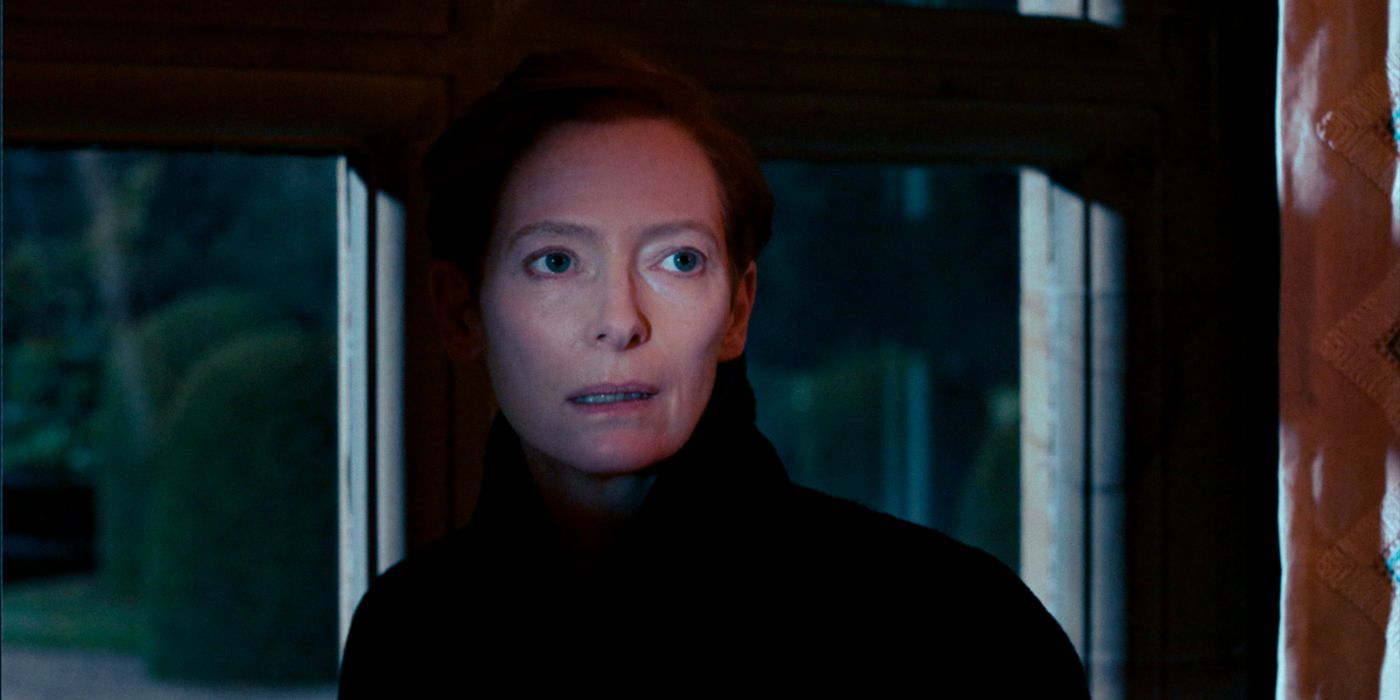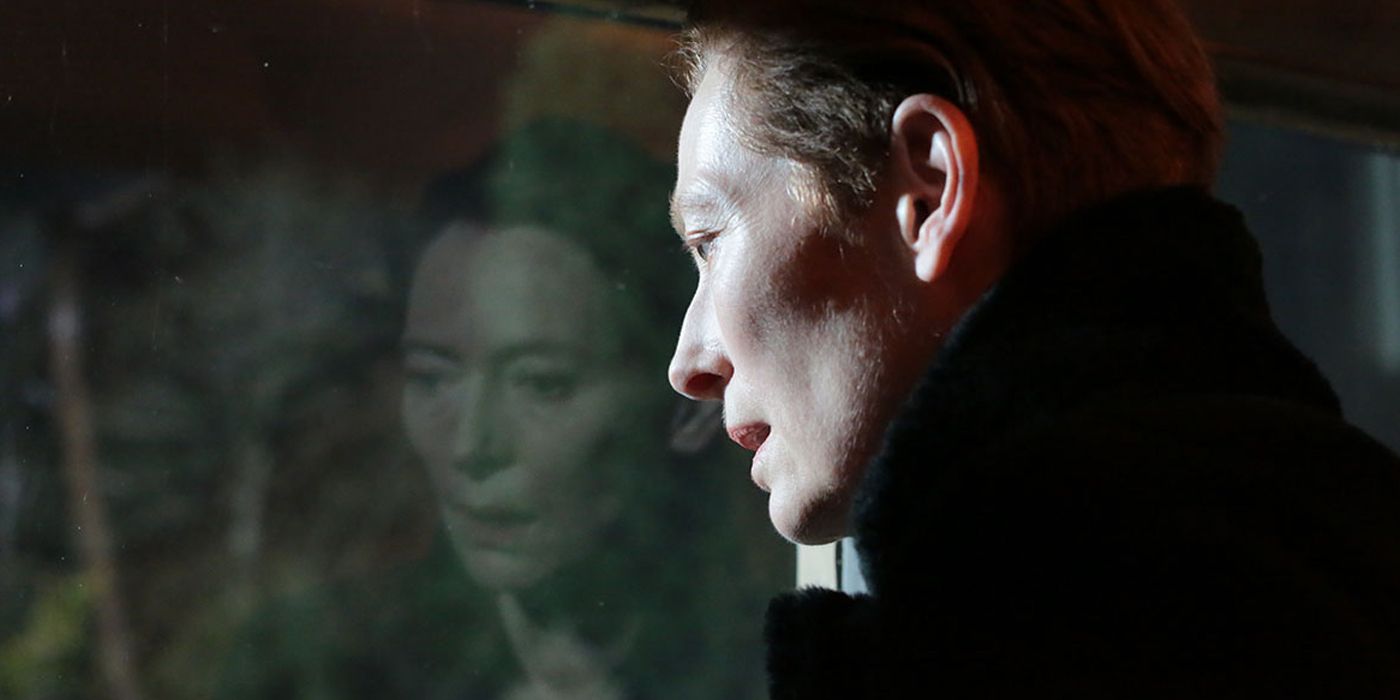The Eternal Daughter was originally published as part of our 2022 Toronto International Film Festival coverage.
With her last two films, The Souvenir and its sequel The Souvenir: Part II, Joanna Hogg explored Julie (played by Honor Swinton Byrne), an aspiring filmmaker first experiencing the pain of doomed love, then attempting to make a film about that love that left its mark on her. Within that story, Hogg cast Tilda Swinton—Honor Swinton Byrne’s actual mother—to play Julie’s mother, a character who isn’t the focal point, but also leaves a lasting impression, a key figure in Julie’s life as he figures herself out. In The Eternal Daughter, Hogg has made the relationship between a mother and daughter the central focus, in what could arguably be the closest we might ever get to a Hogg horror story.
Swinton—in what is starting to become a habit for her—plays dual roles, taking on the part of both Julie and Julie’s mother Rosalind. The pair goes to a secluded hotel together, a hotel which Rosalind often visited in her younger days, while Julie tries to learn more details about her mother’s life in order to make a film about her. From the moment Julie checks into the hotel with a receptionist (a hilariously rude Carly-Sophia Davies) who seems at odds with everything she says, something seems off about this hotel. Fog seems to emanate from the grounds, covering the place in a shroud of secrecy (aided by stunning cinematography from Ed Rutherford), and it seems as though Julie and Rosalind are the only ones staying at the hotel. While The Eternal Daughter sounds like the beginnings of a gothic story, Hogg turns this into a story about the ghosts of the past—both good and bad—and the regrets that haunt us years later.
In a way, The Eternal Daughter almost feels like an additional chapter to The Souvenir’s meta narrative, putting the mother and daughter story at the middle of the story, while Hogg once again investigates the choices she could’ve made differently—except this time with her mother and not with a failed love. Even for a patient, slow-moving storyteller like Hogg, The Eternal Daughter can almost feel glacial in its narrative momentum at times, but that decision matches the haunted tone of the story. Hogg sets this emotional look at her own relationship with her mother within the aesthetics of a ghost story, as Julie remains haunted by what she did do and what she could’ve done. It’s a fascinating approach, and because of it, Hogg’s story keeps us riveted, even when the pace is gradual and ponderous.
Tilda Swinton has worked with some of the greatest directors of our generation, including working multiple times with Wes Anderson, Luca Guadagnino, and Bong Joon-ho. But there’s something truly special about Swinton’s collaborations with Hogg, as through their multiple films together, Hogg is dissecting her relationship with her own mother—a personal journey that is always affecting and beautiful to watch. Swinton has played multiple characters in a film before, but here, it’s not showy, and is almost a way for Hogg to present how in some fundamental ways, we are exactly like our parents. Much like how in the final shot of The Souvenir: Part II, Hogg zoomed out to show the larger picture of her story, with The Eternal Daughter, it’s as if Hogg makes it very obvious from the beginning that this is her working out her feelings towards her mother, who she clearly loved deeply.
And even though this might sound like a dour, almost self-indulgent story, Hogg and Swinton manage to make this deliberately paced tale extremely funny and engaging. Julie and Rosalind mostly spend their days on vacation lounging, walking their dog, doing some minor work, and eating the half-dozen or so items at the hotel restaurant, but their dynamic and relationship together make this all feel like valuable time between the pair. Simply watching Swinton play against herself, and having Hogg dive even deeper into this personal relationship that she couldn’t fully explore in The Souvenir movies, is enough to keep this narrative alluring.
Like with The Souvenir: Part II, Hogg zooms out in the end of The Eternal Daughter as a way to explain what is truly going on here, recontextualizing this vacation, and again, it feels like Hogg opening up to the audience exposing the truth of her reasonings in making this film, and baring her soul to the audience. With these last three films, Hogg has shown the beauty and power of her extremely personal stories, that even when they have an almost supernatural flair to them as they do here, they’re still just as emotional and affecting. In a career full of great performances, Swinton continues to do some of her finest work with Hogg, and Hogg once more proves that she’s one of the most remarkable personal storytellers in cinema today. Through The Eternal Daughter, Hogg continues her journey of self-exploration with stunning and powerful films that flow with brilliance and beauty.
Rating: B
The Eternal Daughter is now playing in theaters.


